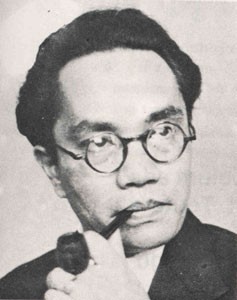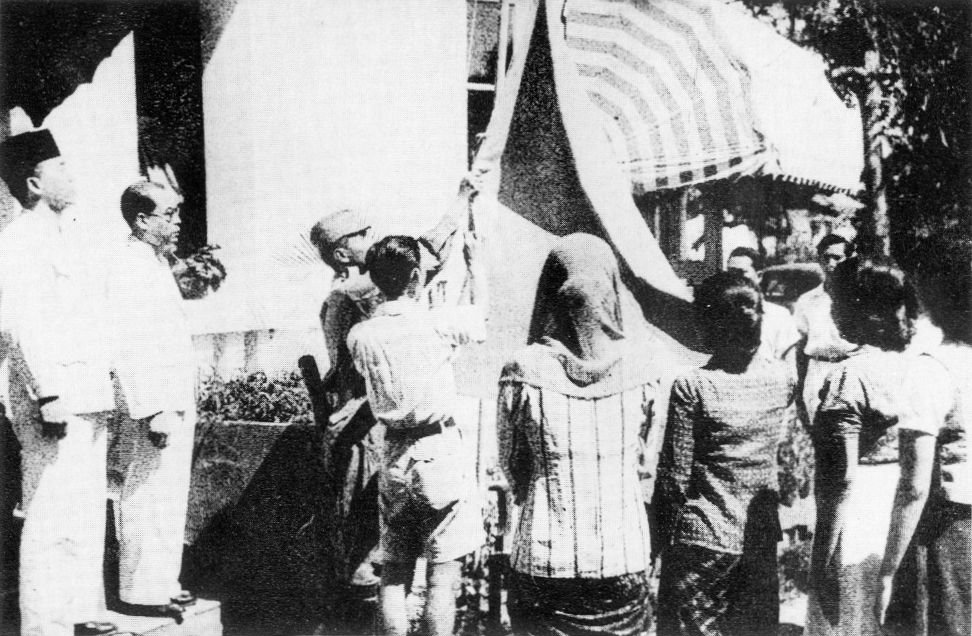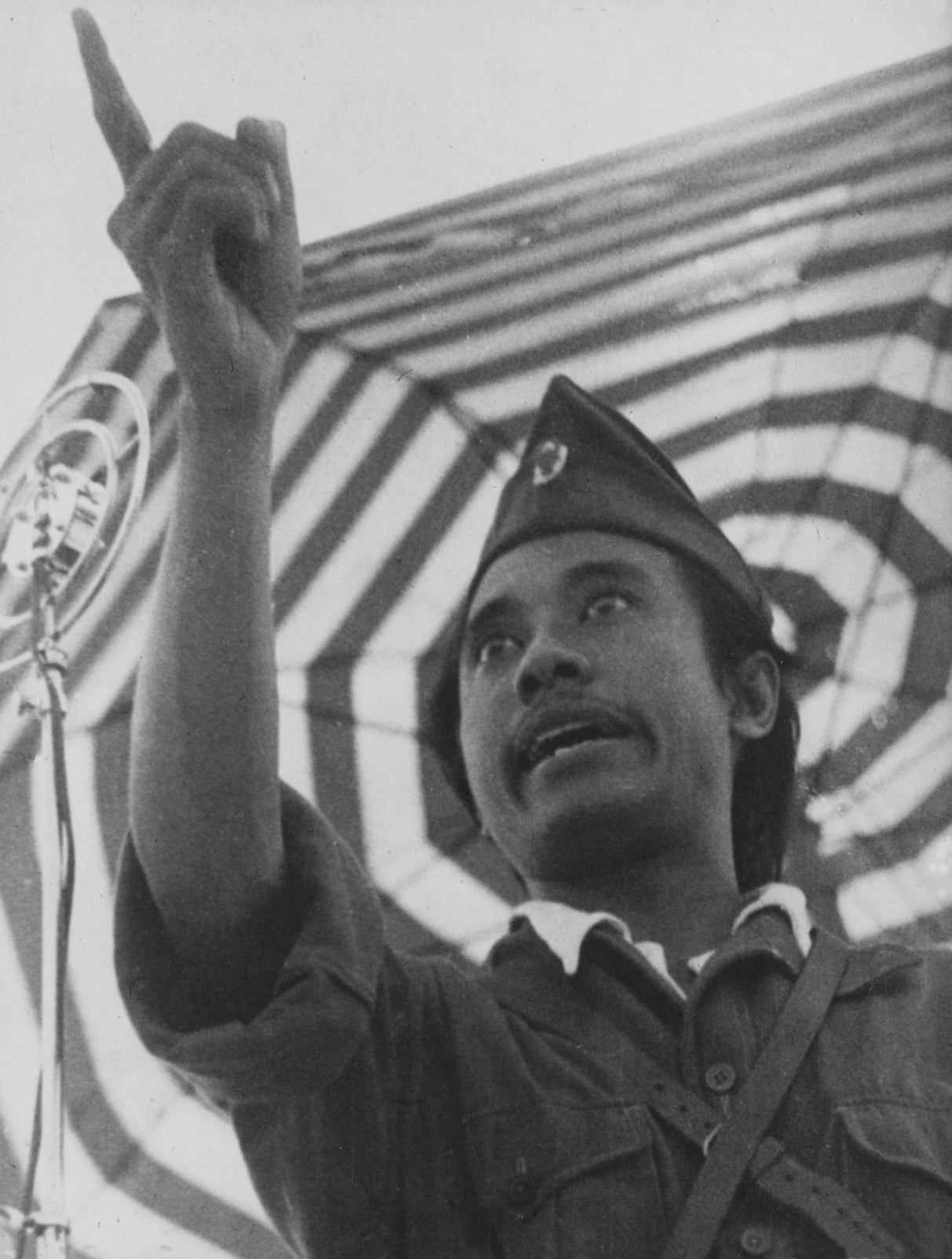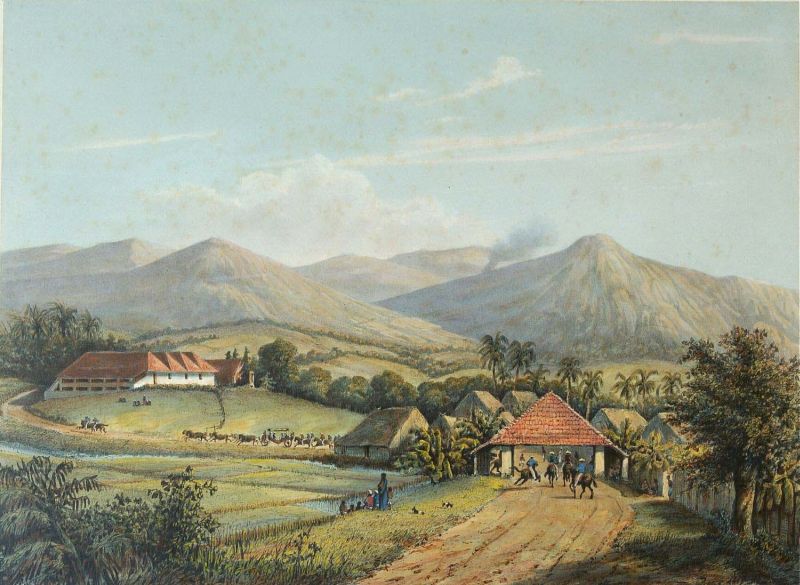|
People's Youth (Indonesia)
People's Youth ( Indonesian: ''Pemuda Rakyat'') was the youth wing of the Communist Party of Indonesia (PKI). The organisation was formed as the Socialist Youth of Indonesia (''Pemuda Sosialis Indonesia'' or ''Pesindo''). Initially the organisation was set up on the initiative of then Minister of Defence Amir Sjarifuddin, as the youth wing of the Socialist Party of Indonesia. A congress was held on 10 and 11 November 1945, where seven locally based youth outfits merged. Rapidly it gained a membership of around 25,000. The organisation took part in the armed struggle for independence during the Indonesian National Revolution. Pesindo units were engaged in intense street fighting during the Battle of Surabaya. Pesindo took part, along with PKI and FDR, in the Madiun Uprising in 1948. In 1950 the organisation established its ties to the Indonesian Communist Party (PKI) and changed its name to "''Pemuda Rakyat''". At the congress of November 1950 Francisca C. Fanggidaej became th ... [...More Info...] [...Related Items...] OR: [Wikipedia] [Google] [Baidu] |
Indonesian Language
Indonesian (; ) is the official language, official and national language of Indonesia. It is a standard language, standardized variety (linguistics), variety of Malay language, Malay, an Austronesian languages, Austronesian language that has been used as a lingua franca in the multilingual Indonesian archipelago for centuries. With over 280 million inhabitants, Indonesia ranks as the list of countries by population, fourth-most populous nation globally. According to the 2020 census, over 97% of Indonesians are fluent in Indonesian, making it the largest language by number of speakers in Southeast Asia and one of the List of languages by total number of speakers, most widely spoken languages in the world.James Neil Sneddon. ''The Indonesian Language: Its History and Role in Modern Society''. UNSW Press, 2004. Indonesian vocabulary has been influenced by various native regional languages such as Javanese language, Javanese, Sundanese language, Sundanese, Minangkabau language, Min ... [...More Info...] [...Related Items...] OR: [Wikipedia] [Google] [Baidu] |
Communist Party Of Indonesia
The Communist Party of Indonesia (Indonesian language, Indonesian: ''Partai Komunis Indonesia'', PKI) was a communist party in the Dutch East Indies and later Indonesia. It was the largest non-ruling communist party in the world before its Indonesian mass killings of 1965–66, violent disbandment in 1965. The party had two million members in the 1955 elections, with 16 percent of the national vote and almost 30 percent of the vote in East Java. At the time, it was the largest communist party in the world after the Chinese and Soviet communist parties. During most of the period immediately following the Indonesian Independence until the eradication of the PKI in 1965, it was a legal party operating openly in the country. Accused of responsibility for the 30 September Movement, 1965 army-led coup attempt, the party was banned by General Suharto in March 1966. History Forerunners The Indies Social Democratic Association (Dutch language, Dutch: ''Indische Sociaal-Democratische ... [...More Info...] [...Related Items...] OR: [Wikipedia] [Google] [Baidu] |
Indonesian Socialist Youth
The Indonesian Socialist Youth (, Pesindo) was a youth-based paramilitary organisation that embraced the principles of socialism to uphold the Republic of Indonesia based on popular sovereignty. Pesindo was particularly closely associated with youth leaders in 1945. The role of youth figures such as Wikana and Chaerul Saleh (Menteng 31 Group and Kaigun Group which later merged into API Jakarta), Soemarsono and Krissubanu (PRI Surabaya), Ibnu Parna (AMRI Semarang) and other figures shaped Pesindo's identity, namely a revolutionary youth organisation against colonialism and fascism. Background On 10 November 1945, the first All-Indonesian Youth Congress was held in Yogyakarta. The event was the initiative of Minister of Information Amir Sjarifuddin, who was then active in the Socialist Party with Sutan Sjahrir. Initially, the purpose of this congress was to unite all youth organisations in Indonesia in one place to fight against colonialism. On the other hand, Amir Sjarifuddi ... [...More Info...] [...Related Items...] OR: [Wikipedia] [Google] [Baidu] |
Amir Sjarifuddin
Amir Sjarifuddin Harahap ( EVO: Amir Sjarifoeddin Harahap; 27 April 1907 – 19 December 1948) was an Indonesian politician and journalist who served as the second prime minister of Indonesia from 1947 until 1948. A major leader of the left wing during the Indonesian National Revolution, he previously served as Minister of Information from 1945 until 1946 and Minister of Defense from 1945 until 1948. Amir was born into the Sumatran aristocracy and was educated at Leiden University. At Leiden, he became a member of the board of the Gymnasium student association in Haarlem and was involved in the Batak student organization '' Jong Batak''. He returned to Indonesia due to family troubles but continued his education at the '' Rechts Hogeschool'' in Batavia. After graduating, he became active in literary and journalist circles, joining the editorial board of the newspaper ''Panorama''. He also became involved with left-wing politics and led a group of younger Marxists in the ... [...More Info...] [...Related Items...] OR: [Wikipedia] [Google] [Baidu] |
Socialist Party Of Indonesia
The Socialist Party of Indonesia (, PSI) was a socialist political party in Indonesia which existed from 1948 until 1960, when it was banned by President Sukarno. Origins In December 1945, Amir Sjarifoeddin's Socialist Party of Indonesia (Parsi) and Sutan Sjahrir's Socialist People's Party (Parsas), both of which had only recently been established, merged to form the Socialist Party. Sjahrir became leader of the combined party. It was popular among young intellectuals and students, as well as members of the underground movements led by the two men during the Japanese occupation of the Dutch East Indies.Kahin (1952) p158 At the end of 1945, the Socialist Party gained five of the 25 seats on the working committee of the Central Indonesian National Committee, the ''de facto'' legislature.Kahin (1952) p171 Both Sjahrir and Amir served terms as List of Prime Ministers of Indonesia, prime minister, while other Socialist Party members held senior cabinet posts.Simanjuntak (2003) ... [...More Info...] [...Related Items...] OR: [Wikipedia] [Google] [Baidu] |
Indonesian National Revolution
The Indonesian National Revolution (), also known as the Indonesian War of Independence (, ), was an armed conflict and diplomatic struggle between the Republic of Indonesia and the Dutch Empire and an internal social revolution during Aftermath of WWII, postwar and Dutch East Indies#World War II and independence, postcolonial Indonesia. It took place between Indonesian Declaration of Independence, Indonesia's declaration of independence in 1945 and the Netherlands' Dutch–Indonesian Round Table Conference, transfer of sovereignty over the Dutch East Indies to the Republic of the United States of Indonesia at the end of 1949. The four-year struggle involved sporadic but bloody armed conflict, internal Indonesian political and communal upheavals, and two major international diplomatic interventions. Dutch military forces (and, for a while, the forces of the World War II Allies, World War II allies) were able to control the major towns, cities and industrial assets in Repu ... [...More Info...] [...Related Items...] OR: [Wikipedia] [Google] [Baidu] |
Battle Of Surabaya
The Battle of Surabaya () was a major battle in the Indonesian National Revolution fought between regular infantry and militia of the Indonesian nationalist movement and British and British Indian Army, British Indian troops against the re-imposition of Dutch East Indies, Dutch colonial rule. The peak of the battle was in November 1945. The battle was the largest single battle of the revolution and became a national symbol of Indonesian resistance. Considered a heroic effort by Indonesians, the battle helped galvanise Indonesian and international support for Indonesian independence. 10 November is celebrated annually as Heroes' Day#Indonesia, Heroes' Day (). By the time British forces arrived at the end of October 1945, the ''Pemuda'' ("youth") foothold in Surabaya, Surabaya City was described as "a strong unified fortress". Fighting broke out on 30 October after the British commander, Brigadier Aubertin Walter Sothern Mallaby, A. W. S. Mallaby was killed in a skirmish. The Bri ... [...More Info...] [...Related Items...] OR: [Wikipedia] [Google] [Baidu] |
People's Democratic Front (Indonesia)
People's Democratic Front (, FDR) was a short-lived united front of leftists in Indonesia, founded in February 1948. FDR included the Communist Party of Indonesia, the Socialist Party, Labour Party of Indonesia, SOBSI and Pesindo. The leader of FDR was Amir Sjarifuddin.Masatoshi, Kisaichi. Popular Movements and Democratization in the Islamic World'. London: Routledge, 2006. p. 110 References Communist parties in Indonesia 1948 establishments in Indonesia Communist Party of Indonesia Defunct left-wing political party alliances Defunct political party alliances in Indonesia Defunct socialist parties in Asia Political parties established in 1948 Political parties with year of disestablishment missing Socialist parties in Indonesia Indonesia Indonesia, officially the Republic of Indonesia, is a country in Southeast Asia and Oceania, between the Indian Ocean, Indian and Pacific Ocean, Pacific oceans. Comprising over List of islands of Indonesia, 17,000 islands, inclu ... [...More Info...] [...Related Items...] OR: [Wikipedia] [Google] [Baidu] |
Madiun Uprising
The Madiun Affair (), known locally as the Communist Party of Indonesia rebellion of 1948 (), was an armed conflict between the government of the self-proclaimed Republic of Indonesia and the left-wing opposition group ''Front Demokrasi Rakyat'' (FDR, People's Democratic Front) during the Indonesian National Revolution. The conflict began on September 18, 1948, in Madiun, East Java, and ended three months later when most FDR leaders and members were detained and executed by TNI forces. Background The downfall of the Sjarifuddin Cabinet and the formation of the Hatta Cabinet Opinions regarding the trigger of the conflict vary. According to Kreutzer, the downfall of Amir Sjarifuddin's government in January 1948 was the origin of the Madiun Affair. Before then, during the second half of 1947, Partai Sosialis was split into two factions: one faction was led by Sjarifuddin, and a smaller faction was led by Sutan Sjahrir. The latter group grew as Sjarifudin put a strong emphas ... [...More Info...] [...Related Items...] OR: [Wikipedia] [Google] [Baidu] |
Fransisca Fanggidaej
Fransisca Casparina Fanggidaej (16 August 1925 – 13 November 2013) was an Indonesian-born Dutch activist, radio announcer, teacher, and translator who was the member of Pemuda Sosialis Indonesia. She was the maternal grandmother of actor Reza Rahadian. Early life Fransisca Casparina Fanggidaej was born on 16 August 1925 in Noelmina, a village in Takari, Kupang Regency, to Gottlieb Fanggidaej and Magda Mael. Her father worked as a head supervisor Burgerlijke Openbare Warken and was referred as "Black Netherlands" by the local. She was raised in Indo cultural and was educated along with the white kids, and spoken Dutch language in her daily life. Career Fransisca felt disturbed when she had to see people lower their heads and squat (whilst walking) to pay respect to her parents. She also encountered some form of racism towards her family from the Dutch settlers due to her being classified as a "colored person", which then began to raise her spirit on anti-colonialism. Thi ... [...More Info...] [...Related Items...] OR: [Wikipedia] [Google] [Baidu] |
Sukatno Hoeseni
Sukatno Hoesni (31 December 1929 – 17 April 1997) was an Indonesian politician. He was a member of the Indonesian Communist Party (PKI) from East Java who served as a member of the House of Representatives (DPR) from 1956 until 1965. He became the youngest member of the DPR when he was inaugurated in 1956. Biography Education and early career Sukatno was born in Malang on 31 December 1929. His father, Wir Margo, worked as a blacksmith at the Lestari sugar factory in , while his mother was a Gerwani activist in . Sukatno received his primary education at a ''Sekolah Rakyat'' (People's School) during the Japanese occupation, and that was his highest level of formal education. While in school, he also worked as a tennis ball boy to pay for his tuition. After graduating from elementary school, he worked as an electrician at the Lestari sugar factory. Later, he worked at a chemical plant located not far from Surabaya. Military and political career Sukatno began his military c ... [...More Info...] [...Related Items...] OR: [Wikipedia] [Google] [Baidu] |
Java
Java is one of the Greater Sunda Islands in Indonesia. It is bordered by the Indian Ocean to the south and the Java Sea (a part of Pacific Ocean) to the north. With a population of 156.9 million people (including Madura) in mid 2024, projected to rise to 158 million at mid 2025, Java is the world's List of islands by population, most populous island, home to approximately 55.7% of the Demographics of Indonesia, Indonesian population (only approximately 44.3% of Indonesian population live outside Java). Indonesia's capital city, Jakarta, is on Java's northwestern coast. Many of the best known events in Indonesian history took place on Java. It was the centre of powerful Hindu-Buddhist empires, the Islamic sultanates, and the core of the colonial Dutch East Indies. Java was also the center of the History of Indonesia, Indonesian struggle for independence during the 1930s and 1940s. Java dominates Indonesia politically, economically and culturally. Four of Indonesia's eig ... [...More Info...] [...Related Items...] OR: [Wikipedia] [Google] [Baidu] |






